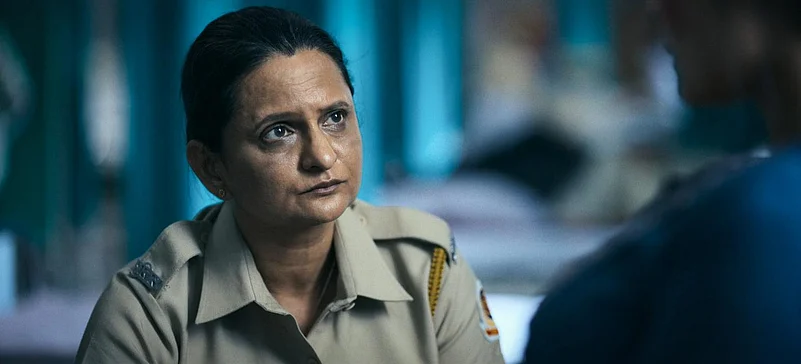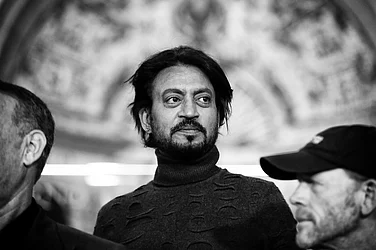Created by Smita Singh and directed by Pankaj Kumar and Surya Balakrishnan, Khauf (2025) is very clear about its antagonist from the very first frame. It isn’t a ghost or some sinister energy lurking in the corridors somewhere—that comes later. It라이브 바카라 the grim persistence of predatory men to turn even the most mundane moments of your life into their personal peep show, all while you’re simply trying to exist.
In Khauf, Delhi is more than a setting. It라이브 바카라 a threat. The series, currently streaming on Amazon Prime, begins with Anu (Asheema Vardaan) in a DTC bus bathed in the sickly flicker of tired fluorescent lights, surrounded by men. The ghost of Nirbhaya and the horror of her fate hovers over this moment and lingers throughout its run. She has to navigate the unsafe gullies of Delhi, where an unknown man harasses her from the shadows with laser pointers—violating her body from a distance even when he cannot touch her, before she can return to the relative safety of her hostel room. The decrepit hostel, the men who guard its gates and are in charge of its resident라이브 바카라 welfare and nourishment are all just as hazardous as the outside threats. But it is the community of women inside that provides the safety net.

Anu has plans to shift out of the hostel with her friend Svetlana (Chum Darang), something that upsets her other hostel mates Nikki (Rashmi Zurail Mann), Rima (Priyanka Setia), and Komal (Riya Shukla). But her bid for freedom is cut short as the series jumps forward six months and stations on Madhu (Monika Panwar) and her own desperate yearning to do the same. Where Anu saw freedom beyond the walls of room 333 (written in the Hindi numeric ३३३, which flipped is ६६६, 666, the devil라이브 바카라 number), Madhu stakes her hopes within them.
Over the course of eight episodes, with roughly six hours of runtime, Khauf introduces three other storylines, all of which collapse into each other towards the end. There라이브 바카라 the strict but caring warden Gracie Dungdung (played by an assured Shalini Vatsa) and her best friend and drinking partner Constable Ilu Mishra (Geetanjali Kulkarni), who is worried about her son troubled Jeeva라이브 바카라 (Satyam Sharma) disappearance. There라이브 바카라 Madhu라이브 바카라 employer and local guardian, Dr. Shohini Verma (Shilpa Shukla), a psychiatrist who tries to unravel the mystery of a possible shared psychosis that has kept Nikki, Rima and Komal confined to the premises of the hostel. Then there라이브 바카라 Rajat Kapoor라이브 바카라 eerie Hakim, another predator pretending to be a saviour.

If you’re looking for a show that sidesteps the everyday horrors women live through or subverts it in comical ways (think Stree), Khauf isn’t it. Here, trauma isn’t subtext—it라이브 바카라 the spine of the very story. It is unsettling and sinister and it will make you anxious. Watching Khauf, you will have the disconcerting realisation why we say “not all men, but always a man”. And there is literally no way of knowing which apple is rotten till it poisons you and leaves you on the floor to die the most agonising of deaths.
Panwar라이브 바카라 Madhu becomes the unwilling vessel for the show's most harrowing violences—from gang rape to literal possession by the spectre of toxic masculinity. Yet she keeps rising, resilient and defiant, whether facing men directly or the women who, through patriarchal bargaining, have learned to survive by upholding the very structures that oppress them. Here Madhu becomes the very representation of all womankind navigating a terrain where setting off a few landmines is the only way to expose the arsenal buried beneath her feet.

The two men in her life come with their own sets of patriarchal burdens. Her boyfriend Arun (Abhishek Chauhan), who has seemingly stood by her through everything, is patronising on good days and abusive on his bad ones. Her friend Bela라이브 바카라 (Aasttha Ssidhana) mysterious fiance Nakul (Gagan Arora) is less a person and more the embodiment of gaslighting itself. However, Khauf offers much more for us to dissect than duplicitous “nice guys” and privileged rapists. There are serial killers, shamans who sacrifice women for the sake of their own salvation, and incel men who think women owe them their bodies. Then there is the unbearable ordinariness of everyday violence on women.
Khauf doesn’t explore the origins of male violence—it simply accepts it as the root of all evil. It plays around the concept of madness as a feminine malady assigned to us by the very men who refuse to see themselves as perpetual perpetrators in our lives.
At the end of the day, Khauf may not be perfect with its occasionally cheesy practical effects (dolls and plastic tubes that double as newborns and umbilical cords), unexplored subplots never mentioned again (like bloody and blended fingers in mixer grinders) and all the usual horror tropes it falls back on. But, despite its missteps, it remains an effective exploration of patriarchal trauma, the Sisyphean task of surviving in this world as a woman, and the ever-present threat of male violence. In that way, Khauf is yet another reminder of what my mother always told me as a kid: no ghost is scarier than a man, no spirit can harm you as much as a human being can.
Debiparna Chakraborty is a film, TV, and culture critic dissecting media at the intersection of gender, politics, and power















